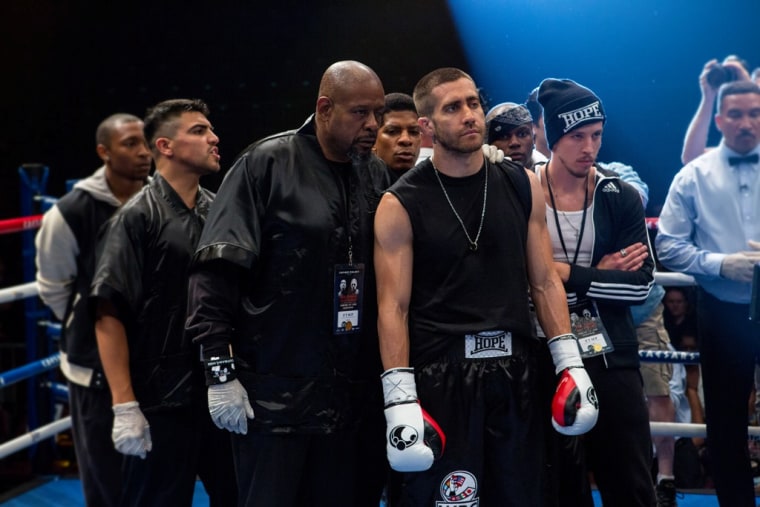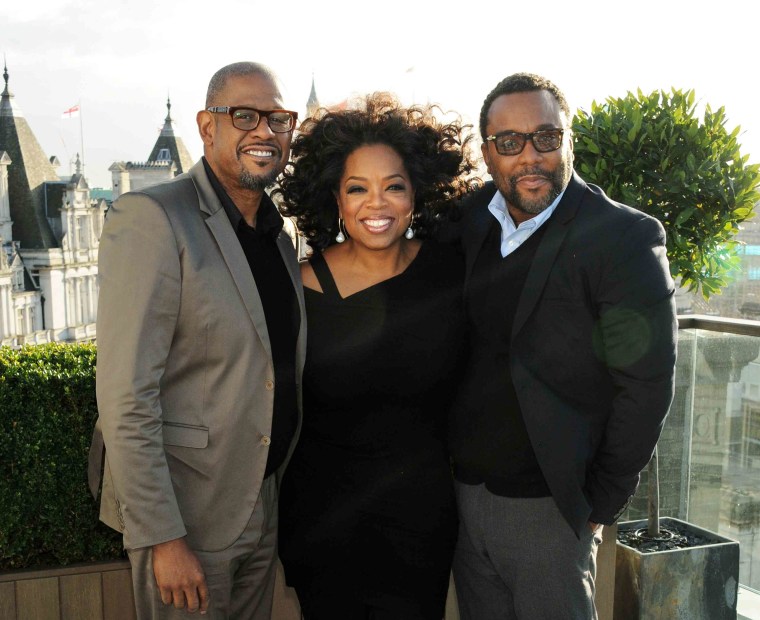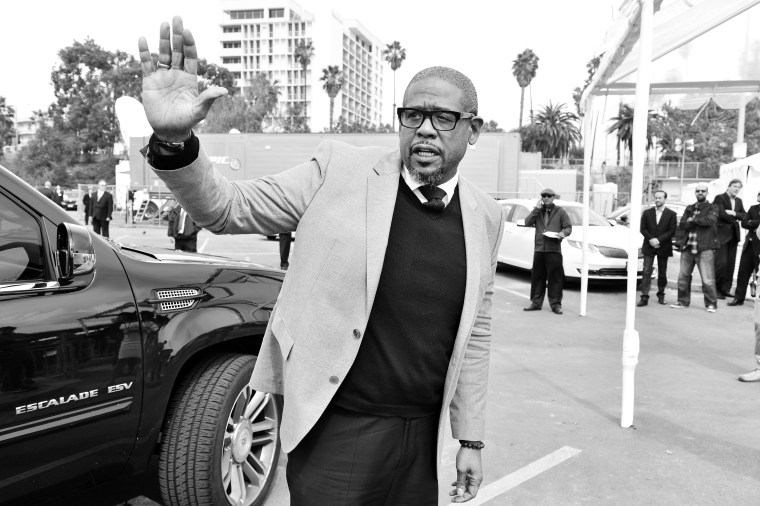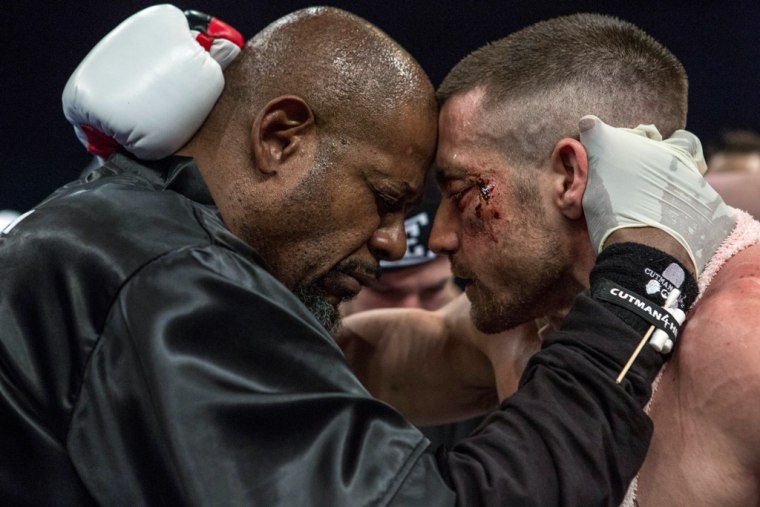Among many esteemed industry prizes, 54-year-old actor, producer, and director Forest Whitaker knocked out all of the other 2006 Best Actor nominees to win the Academy Award for his stunning performance as Ugandan dictator Idi Amin in the film “The Last King of Scotland”.
His latest turn, “Southpaw”, stars Jake Gyllenhaal as Billy "The Great" Hope, reigning junior middleweight boxing champion with a charmed life, wife, and daughter. After Billy suffers through a tragic fall from grace, it is Forest’s character Tick Willis on whom he leans.
Already, there is Oscar buzz for Forest’s portrayal of a former fighter who now trains amateur boxers at a gritty, urban gym.
Whitaker recently took a few minutes to talk to NBCBLK contributor Patrick L. Riley about what drew him to this role, working with “Empire” boss Lee Daniels in ‘The Butler’, and memories of directing Whitney Houston and cast in “Waiting to Exhale”.

Patrick: Congratulations on “SOUTHPAW,” I saw it last night. What drew you to the role?
FOREST WHITAKER: Cool. You liked it! Thank you. This man Tick Willis was dealing with his own personal redemption from a couple of mistakes he’d made in his past. And he tried to take care of the young kids in the community. He dedicated himself to shaping men – including Hope played by Jake Gyllenhaal.
Patrick: Now, we KNOW you did lots of preparation for “The Last King of Scotland” – including a 50 pound weight gain. What did you do to prepare for this role?
FOREST WHITAKER: I was familiar with boxing, gyms, sparring, and things of that nature. I think what was really big, new territory for me was understanding how to work the ring and be a coach. They had experts there who helped me figure out the intricate details of dealing with a fighter, cuts, wrapping gloves, conditioning a fighter. So, there was a lot there that I needed to understand.
Patrick: Many critics in general speak of the “white savior” mentality in Hollywood film. Your character – some might argue – is the “savior” in this narrative. What do you make of that? And to what degree is Tick Willis the moral compass of this tale?
FOREST WHITAKER: I think in a lot of respects, my character Tick has clarity on what he thinks is right and wrong. And what compromise means in terms of compromising your soul. When the character Billy comes to my character’s gym, he’s coming because not only is Tick a great trainer. But Tick can help Billy rebuild his insides. So, he sees in Tick the chance to rebuild that internal strength.
Patrick: 50 Cent co-stars in the film as a boxing manager. And you and he share some camera time. How’d he hold up?
FOREST WHITAKER: I really thought 50 Cent did a great job with his character. It was totally credible and believable. When we were working the scene, I wasn’t seeing him as a rap artist, but as one of my peers as we tried to work the scene. I felt like he did a strong job. No question that he’s the boxing manager he plays.
Patrick: Southpaw’s director Antoine Fuqua is one of Hollywood’s premier directors: an African American. He led Denzel Washington to his Academy Award for “Training Day”. How was it to work with him?
FOREST WHITAKER: Antoine Fuqua is an extremely well-rounded filmmaker. He understands the technical aspects of filmmaking to a degree that not all filmmakers do. At the same time, you can talk to him about scripts and character and trying to develop and pull a great performance out of the script. He does a great job. So, it’s unique. And he’s passionate. In this movie, he was training all the time. He got inside the concept of boxing and understanding what it was like. Every day, he was training in the gym. He’s a good fighter too.
Patrick: Lee Daniels directed you in “The Butler”. Now, Lee is taking television by storm in “Empire”. Can we look to see you perhaps in “Empire”? Acting or guest directing?
FOREST WHITAKER: I’m really happy for Lee. He’s done some really amazing things and opened up some new territory. He’s reshaping television and what people think they want to watch. He’s doing a great job. It’s intriguing and exciting. I remember I was at a speaking engagement at a school in Upstate New York and the whole school seemed to shut down to go watch “Empire”. [He laughs] I know we’re going to work together some more. Lee spoke to me about the first episode and I was filming. But I’m sure at some point, we’ll come back together and work on something together.

Patrick: You went from turning down West Point to play ball for Cal Poly Pomona, to an injury and a new career direction. Then, you went to USC as a would-be tenor and switched to drama. After all of those promising turns, how did it feel, once you committed to acting and ultimately directing?
FOREST WHITAKER: There was a time in my acting career, where I was trying to figure out if acting was the thing to do. You know? I was always on this journey of trying to learn more about humanity and people - using the characters and situations as guideposts. I could switch up and do another job as long as I’m continuing that same search and that same journey of revealing my connection to humanity and the universe. And directing gives me the opportunity to explore ALL these different lives and their connection to their environments and the people. And I get to connect to the wires of the universe. How this person meets this person and walks down the street and then meets this person.
Patrick: You directed “Southpaw” director Antoine Fuqua’s current wife Lela Rochon, Angela Bassett, Gloria Devine, and THE Whitney Houston in “Waiting to Exhale”. You also directed the music video of the movie’s theme song, “Exhale (Shoop Shoop)”. Share a sweet memory with us on what it was like to work on that project. Were you – at any point – in talks to direct the sequel that was being talked about before her passing?
FOREST WHITAKER: It was an amazing experience. Just beautiful, powerful! To get to work with each one was something really special. I remember shooting this odd scene at the ostrich races in this town and the reaction from Angela and Loretta Devine as they were talking about their pain and their lives. There was something very open about them. Healing. Feeling good about yourself as you are. Move Forward. Love yourself. You know?
Patrick: And it lives timelessly right now. Fruitvale Station is the story of how a young, African American man from the hood gets in an altercation with police that ends tragically. You were one of the producers of the film Fruitvale Station, which won the Grand Jury Prize and the Audience Award for U.S. dramatic film at the 2013 Sundance Film Festival. How much would you say this film has reflected and helped shed awareness or inspire efforts continuing to be made around the #blacklivesmatter movement?
FOREST WHITAKER: I think it was a very important film. There are so many issues with profiling, etc. This was an opportunity to be a part of the dialogue. Get people talking more. And get people aware. You can see it in the news but not unless you see it revealed before you.
[This interview has been edited and condensed for clarity]


